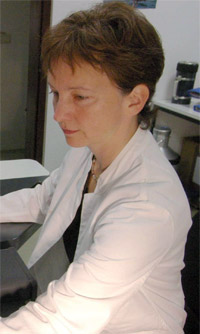Antarctica: Conservation in Action
Kerstin Beyer

After high school I got an education as a technical assistant at the Senckenberg Research Institute and the Natural History Museum (Frankfurt/Main) and finished my Technical Assistant for Biology and Geology degree after two years. During my studies in Frankfurt, I got involved in polar biology by sorting preserved biological samples from expeditions to the Arctic and Antarctic, and I was fascinated by the organisms being able to survive in such cold climate.
I then applied at the Alfred Wegener Institute, the German polar research institute. I consider myself very lucky since I participated in several expeditions to the both polar regions, the Arctic and the Antarctic. Mostly, I worked on the German research ice-breaker Polarstern which is operated by the Alfred Wegener Institute. The Polarstern provides a unique working platform from which a lot of different scientific sampling devices, e.g., nets for taking zooplankton samples or grabs for taking sediment samples, can be deployed. The cruises usually last from eight to twelve weeks, and I go to sea every second or third year. So far I have spent twenty months onboard. Fieldwork on the ship is totally different from laboratory work at the institute. Dressed in heavy jackets and pants, we work either on deck or on the ice to get our samples, often at temperatures well below freezing and in chilly winds. Later the samples are sorted in the cold-labs on board. At home we study the samples' taxonomy, genetic makeup, and carry out ecological investigations (e.g., analysis of gut content to understand how the creatures feed).
I changed research focus several times. From small zooplankton - these are the organisms that spend their life drifting in the water column - I switched to working on the sea-ice inhabitants, and now my work focuses on large benthic communities, which includes sea-stars, sea-urchins, brittle stars, and all other creatures living on or in the sea bottom. Because of these changes, I learned a lot about the diversity of marine organisms, their behaviour and their interactions.
What has been the most memorable moment or event in your career?
This was certainly my first expedition to Antarctica, which was the most exciting trip I ever did. It was an exceptional experience to feel the extreme inhospitable environment with icy winds, snowstorms, ice as far as the horizon and, on the other side, to see the sun glittering on a sea ice-field, the mystic colours of icebergs and the amazing animals such as penguins, seals, whales and, of course, the organisms we found in our samples. I especially enjoyed working in penguin colonies, where we counted young chicks. These were the most impressive moments in my live.
Who or what has been a major inspiration to you?
When I was a child I loved to see the movies by Jacques-Yves Cousteau and Hans Hass - the first divers who explored the mystic underwater-world and presented their findings to the public. Their books and movies made me curious about the marine world.
In your opinion what is the biggest challenge facing the world (or your part of the world) today?
Working in such sensitive and fascinating environment as the poles makes you aware of how insensitive mankind treats nature and living creatures. On my last expedition we explored a region on the Antarctic Peninsula, which had been covered by shelf ice for millions of years. This region is now accessible by boat because 10,000 km2 of the shelf ice broke off over the past twelve years. We are not yet sure if this was caused only by climate change, i.e., temperature rise, or if it was some other phenomenon. Nevertheless, there is no other place on Earth where the temperature increased so dramatically over the last century. And this is certainly caused by climate change.
For further information about the Institute and the last expedition have a look at:
 Funded by TEK
Funded by TEK